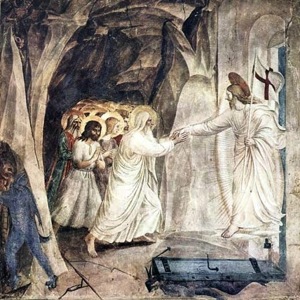
 HE GREATEST understatement of the liturgical calendar is embodied in the name “Good Friday.” It is not an ironic overstatement, but a subdued adjective to describe The Greatest Act of Love.
HE GREATEST understatement of the liturgical calendar is embodied in the name “Good Friday.” It is not an ironic overstatement, but a subdued adjective to describe The Greatest Act of Love.
We know well the famous quote from John 3:16: “For God so loved the world that he gave his only Son, so that everyone who believes in him might not perish but might have eternal life.” It is so familiar it has become cliché. But we must take this to heart as much as we possibly can.
In opening the Gates of Heaven, Christ shows the greatest act of love “…the love of God doesn’t end in death. It goes beyond it. Death is no hindrance to the love of God…he loves us and he wants us to live forever.” (Peter G. van Breemen, SJ, As Bread That Is Broken, pg. 168-169)
The Order of Christian Funerals emphasizes that sacred music must express “a spirit of hope in Christian’s share in Christ’s victory over death.” (OCF #31) Sacred music at a funeral must express this hope.
But Good Friday is no funeral. For death has no power over Christ. And we should rejoice because this is what he wants for us.
 HE CATECHISM of the Roman Catholic Church has much to say about Christ’s descent into hell—something we profess every time we say the Apostles Creed. This section of the catechism, which even quotes the Exsultet, is deeply profound. Read it in full here.
HE CATECHISM of the Roman Catholic Church has much to say about Christ’s descent into hell—something we profess every time we say the Apostles Creed. This section of the catechism, which even quotes the Exsultet, is deeply profound. Read it in full here.
The Catechism states: “Jesus, like all men, experienced death and in his soul joined the others in the realm of the dead. But he descended there as Savior, proclaiming the Good News to the spirits imprisoned there.” (§632, Catechism of the Catholic Church)
The Catechism describes the significance of Christ’s sacrifice to humankind of all ages:
“The gospel was preached even to the dead.” The descent into hell brings the Gospel message of salvation to complete fulfillment. This is the last phase of Jesus’ messianic mission, a phase which is condensed in time but vast in its real significance: the spread of Christ’s redemptive work to all men of all times and all places, for all who are saved have been made sharers in the redemption. (§634, CCC)
In summary: “In his human soul united to his divine person, the dead Christ went down to the realm of the dead. He opened heaven’s gates for the just who had gone before him.(§637, CCC)
Jesus’ love for the Father—and for us all—is so great, that there was only one choice: to do the will of the Father in order to redeem us all. This is why we must sing everything from the viewpoint of the Resurrection, especially on Good Friday.
Now read the words of John 3:16 again:
“For God so loved the world that he gave his only Son, so that everyone who believes in him might not perish but might have eternal life.”
The love of Christ is more than we can bear. Repent and believe.
